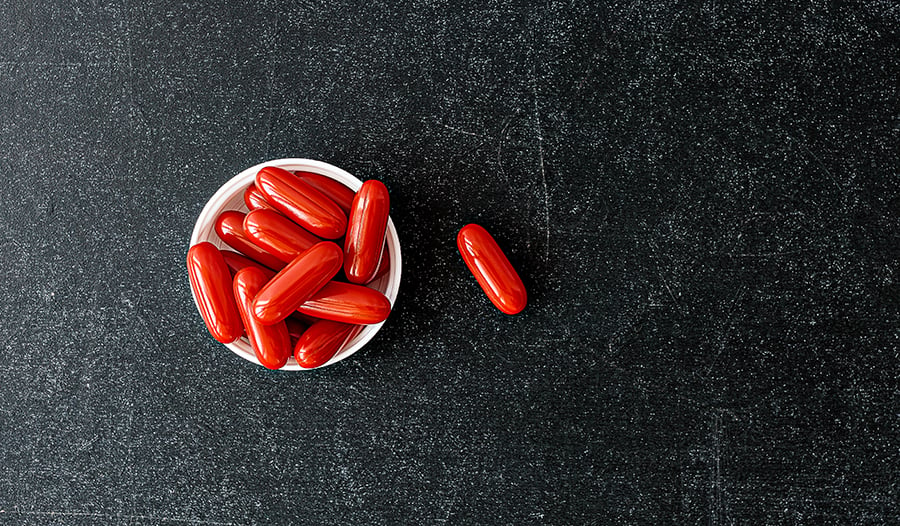Coenzyme Q10 Health Benefits: Boost Heart Health, Energy, Antioxidant Levels, and More

Originally Posted April 2017 / Updated August 2023
Discover the fantastic benefits of Coenzyme Q10 for your overall health, particularly in improving heart health, energy, and antioxidant levels.
What Is CoQ10?
Coenzyme Q10 (CoQ10) is an essential component of the mitochondria, the cellular compartments that produce the power that cells need to divide, move, contract, and perform all their other functions.
CoQ10 is critical in producing adenosine triphosphate (ATP), the chemical currency of cellular energy that drives all body processes. Moreover, CoQ10 is an essential antioxidant that protects cells against damage.
Who Should Supplement with CoQ10?
Although our bodies can produce CoQ10, we don’t always make enough, so supplementation of CoQ10 is so important. Because the brain and heart are among the most active tissues in the body, CoQ10 deficiency affects these tissues the most and can lead to severe problems with the function of these critical organs.
Several factors can lead to inadequate CoQ10 levels—poor diet, a genetic or acquired defect, aging, or increased tissue needs. For example, most heart and vascular conditions, including high cholesterol and elevated blood pressure, are associated with low CoQ10 levels. In addition, both cholesterol-lowering and blood pressure-lowering drugs are known to lower tissue CoQ10 levels. Low CoQ10 levels are also found in people with inflammation, obesity, and diabetes. And typically, CoQ10 levels decline with age. As a result, many people over 50 may not have enough CoQ10 in their body tissues.
In these situations and more, CoQ10 supplementation makes a lot of sense. In fact, given the central role of CoQ10 in mitochondrial function and cell protection, it is an essential supplement for most people to consider.
9 Health Benefits of CoQ10
CoQ10 has emerged over the last 40 years as a best-selling dietary supplement based on a large body of scientific research highlighting significant health benefits.
Most of these health benefits of CoQ10 revolve around its ability to improve energy production and act as an antioxidant. Here is just a partial list of body functions or situations where CoQ10 has been shown to exert beneficial effects:
- Antioxidant system
- Blood sugar control
- Brain health
- Eye (retinal and macular health)
- Fatigue
- Fertility (for both men and women)
- Heart and vascular health
- Immune system support
- Periodontal and gum health
Why Is CoQ10 Important for Heart Health?
The most popular use of CoQ10 is in supporting heart health.
Human clinical trials have extensively documented the benefits of CoQ10 in this application. It is easy to understand why, as whenever cells of the heart are stressed or challenged, it creates an increased demand for CoQ10. Supplementation with CoQ10 in these situations meets this demand and allows the individual cells of the heart muscle to generate more energy and utilize oxygen more efficiently. And as a result, the function of the heart is improved.
Here are the critical benefits noted in these clinical studies with CoQ10 in improving the function of the heart:
- Increased use of oxygen by the heart muscle.
- Increased production of cellular energy production by the heart muscle.
- Increased exercise capacity in people with impaired heart function.
- Improved blood pressure control.
CoQ10 is also essential in people taking a “statin” drug to lower cholesterol. The manufacture of cholesterol and CoQ10 flows down the same biochemical pathway. Statins block this pathway upstream of both CoQ10 and cholesterol. This blockage leads to lower levels of both cholesterol and CoQ10. With statin use, CoQ10 levels can drop by as much as 50%.
Researchers have concluded that lower CoQ10 levels caused by statin drugs might be responsible for some of the side effects reported for statins, such as fatigue and muscle pain. Supplementation with CoQ10 in statin users can improve the tolerability of these drugs.
Commercial Forms of CoQ10 and Dosage Considerations
Most commercially CoQ10 is primarily produced via a yeast fermentation process. CoQ10 is available in two interchangeable chemical forms in the body – ubiquinone and ubiquinol. These two forms are also available as dietary supplements, but once absorbed, the two forms are interchangeable. About 95% of the CoQ10 in the body is in the ubiquinol form. This form is the most active. However, taking ubiquinone usually results in easy conversion to ubiquinol in the body. So, either form ultimately raises ubiquinol levels in the blood.
Ubiquinone is a crystalline powder insoluble in water and difficult to absorb when given on an empty stomach. However, when taken with food (especially with oils), ubiquinone is absorbed at least two times better than when taken on an empty stomach.
The ubiquinol form does have better solubility and, as a result, improved bioavailability over ubiquinone.
The general dosage for ubiquinol is 100 mg daily, while the dosage for ubiquinone is 200 to 300 mg daily. My recommendation is to use the higher dosage levels. Fortunately, there is a lot of existing information from all the published clinical studies that allow appropriate dosage recommendations for either form. Be sure to take CoQ10 with food for maximum absorption.
Side Effects and Drug Interactions
CoQ10 is very safe; dosages up to 1,200 mg/day in adults have not produced side effects.
In addition to statins, other drugs may lower CoQ10 levels by blocking its manufacture. These include cholesterol-lowering other medicines, beta-blockers, phenothiazines, and tricyclic antidepressants.
References:
- Mantle D, Turton N, Hargreaves IP. Depletion and Supplementation of Coenzyme Q10 in Secondary Deficiency Disorders. Front Biosci (Landmark Ed). 2022 Dec 19;27(12):322.
- Díaz-Casado ME, Quiles JL, Barriocanal-Casado E, et al. The Paradox of Coenzyme Q10 in Aging. Nutrients. 2019 Sep 14;11(9):2221.
- Akbari A, Mobini GR, Agah S, et al. Coenzyme Q10 supplementation and oxidative stress parameters: a systematic review and meta-analysis of clinical trials. Eur J Clin Pharmacol. 2020 Jun 25.
- Mantle D, Hargreaves IP. Coenzyme Q10 and Endocrine Disorders: An Overview. Antioxidants (Basel). 2023 Feb 17;12(2):514.
- Bagheri S, Haddadi R, Saki S, et al. Neuroprotective effects of coenzyme Q10 on neurological diseases: a review article. Front Neurosci. 2023 Jun 23;17:1188839.
- García-López C, García-López V, Matamoros JA et al. The Role of Citicoline and Coenzyme Q10 in Retinal Pathology. Int J Mol Sci. 2023 Mar 7;24(6):5072. doi: 10.3390/ijms24065072. PMID: 36982157; PMCID: PMC10049438.
- Tsai IC, Hsu CW, Chang CH, et al. Effectiveness of Coenzyme Q10 Supplementation for Reducing Fatigue: A Systematic Review and Meta-Analysis of Randomized Controlled Trials. Front Pharmacol. 2022 Aug 24;13:883251.
- Hornos Carneiro MF, Colaiácovo MP. Beneficial antioxidant effects of Coenzyme Q10 on reproduction. Vitam Horm. 2023;121:143-167.
- Martelli A, Testai L, Colletti A, Cicero AFG. Coenzyme Q10: Clinical Applications in Cardiovascular Diseases. Antioxidants (Basel). 2020 Apr 22;9(4):341.
- Di Lorenzo A, Iannuzzo G, Parlato A, et al. Clinical Evidence for Q10 Coenzyme Supplementation in Heart Failure: From Energetics to Functional Improvement. J Clin Med. 2020 Apr 27;9(5):1266. doi: 10.3390/jcm9051266.
- Alarcón-Vieco E, Martínez-García I, Sequí-Domínguez I, et al. Effect of coenzyme Q10 on cardiac function and survival in heart failure: an overview of systematic reviews and meta-analyses. Food Funct. 2023 Jul 17;14(14):6302-6311.
- Mantle D, Heaton RA, Hargreaves IP. Coenzyme Q10 and Immune Function: An Overview. Antioxidants (Basel). 2021 May 11;10(5):759.
- López-Pedrera C, Villalba JM, Patiño-Trives AM, et al. Therapeutic Potential and Immunomodulatory Role of Coenzyme Q10 and Its Analogues in Systemic Autoimmune Diseases. Antioxidants (Basel). 2021 Apr 13;10(4):600
- Merle CL, Lenzen C, Schmalz G, Ziebolz D. Systematic Review on Protocols of Coenzyme Q10 Supplementation in Non-Surgical Periodontitis Therapy. Nutrients. 2023 Mar 24;15(7):1585.
- Qu H, Meng YY, Chai H, et al. The effect of statin treatment on circulating coenzyme Q10 concentrations: an updated meta-analysis of randomized controlled trials. Eur J Med Res. 2018 Nov 10;23(1):57. doi: 10.1186/s40001-018-0353-6. PMID: 30414615; PMCID: PMC6230224.
- Kloer HU, Belardinelli R, Ruchong O, Rosenfeldt F. Combining Ubiquinol With a Statin May Benefit Hypercholesterolaemic Patients With Chronic Heart Failure. Heart Lung Circ. 2020 Feb;29(2):188-195.
- Ochiai A, Itagaki S, Kurokawa T, et al. Improvement in intestinal coenzyme q10 absorption by food intake. Yakugaku Zasshi. 2007 Aug;127(8):1251-4.
- Hosoe K, Kitano M, Kishida H, et al. Study on safety and bioavailability of ubiquinol (Kaneka QH) after single and 4-week multiple oral administration to healthy volunteers. Regul Toxicol Pharmacol. 2007 Feb;47(1):19-28.
- Zhang Y, Liu J, Chen XQ, Chen CY . Ubiquinol is superior to ubiquinone to enhance Coenzyme Q10 status in older men. Food Funct. 2018 Nov 14;9(11):5653-5659.
- Arenas-Jal M, Suñé-Negre JM, García-Montoya E. Coenzyme Q10 supplementation: Efficacy, safety, and formulation challenges. Compr Rev Food Sci Food Saf. 2020 Mar;19(2):574-594.
DISCLAIMER:This Wellness Hub does not intend to provide diagnosis...
















































































 Table of Contents
Table of Contents
















